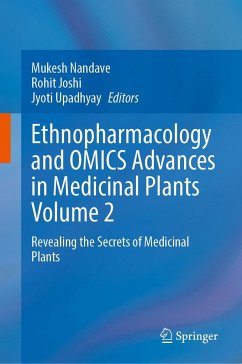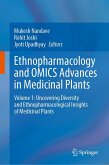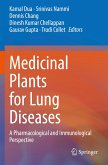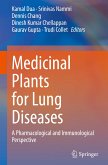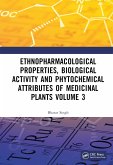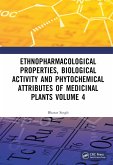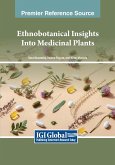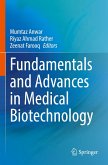Ethnopharmacology and OMICS Advances in Medicinal Plants Volume 2
Revealing the Secrets of Medicinal Plants
Herausgegeben:Nandave, Mukesh; Joshi, Rohit; Upadhyay, Jyoti
Ethnopharmacology and OMICS Advances in Medicinal Plants Volume 2
Revealing the Secrets of Medicinal Plants
Herausgegeben:Nandave, Mukesh; Joshi, Rohit; Upadhyay, Jyoti
- Gebundenes Buch
- Merkliste
- Auf die Merkliste
- Bewerten Bewerten
- Teilen
- Produkt teilen
- Produkterinnerung
- Produkterinnerung
This book delves into diverse facets and applications of medicinal plants. It discusses the metabolic, transcriptomic, and genomic intricacies of medicinal plants, shedding light on their chemical compositions, genetic makeup, and regulatory mechanisms. It includes a chapter on nanotechnology, investigating the influence of nanoparticles on medicinal plants. Subsequent chapters explore functional genomics and genome editing, showcasing innovative approaches to modifying plant genetics. It also discusses plant-associated microorganisms in the microbiome and endophytic fungi. Furthermore, the…mehr
Andere Kunden interessierten sich auch für
![Ethnopharmacology and OMICS Advances in Medicinal Plants Volume 1 Ethnopharmacology and OMICS Advances in Medicinal Plants Volume 1]() Ethnopharmacology and OMICS Advances in Medicinal Plants Volume 1116,99 €
Ethnopharmacology and OMICS Advances in Medicinal Plants Volume 1116,99 €![Medicinal Plants for Lung Diseases Medicinal Plants for Lung Diseases]() Medicinal Plants for Lung Diseases139,99 €
Medicinal Plants for Lung Diseases139,99 €![Medicinal Plants for Lung Diseases Medicinal Plants for Lung Diseases]() Medicinal Plants for Lung Diseases139,99 €
Medicinal Plants for Lung Diseases139,99 €![Ethnopharmacological Properties, Biological Activity and Phytochemical Attributes of Medicinal Plants Volume 3 Ethnopharmacological Properties, Biological Activity and Phytochemical Attributes of Medicinal Plants Volume 3]() Bharat SinghEthnopharmacological Properties, Biological Activity and Phytochemical Attributes of Medicinal Plants Volume 3215,99 €
Bharat SinghEthnopharmacological Properties, Biological Activity and Phytochemical Attributes of Medicinal Plants Volume 3215,99 €![Ethnopharmacological Properties, Biological Activity and Phytochemical Attributes of Medicinal Plants Volume 4 Ethnopharmacological Properties, Biological Activity and Phytochemical Attributes of Medicinal Plants Volume 4]() Bharat SinghEthnopharmacological Properties, Biological Activity and Phytochemical Attributes of Medicinal Plants Volume 4215,99 €
Bharat SinghEthnopharmacological Properties, Biological Activity and Phytochemical Attributes of Medicinal Plants Volume 4215,99 €![Ethnobotanical Insights Into Medicinal Plants Ethnobotanical Insights Into Medicinal Plants]() Ethnobotanical Insights Into Medicinal Plants331,99 €
Ethnobotanical Insights Into Medicinal Plants331,99 €![Fundamentals and Advances in Medical Biotechnology Fundamentals and Advances in Medical Biotechnology]() Fundamentals and Advances in Medical Biotechnology108,99 €
Fundamentals and Advances in Medical Biotechnology108,99 €-
-
-
This book delves into diverse facets and applications of medicinal plants. It discusses the metabolic, transcriptomic, and genomic intricacies of medicinal plants, shedding light on their chemical compositions, genetic makeup, and regulatory mechanisms. It includes a chapter on nanotechnology, investigating the influence of nanoparticles on medicinal plants. Subsequent chapters explore functional genomics and genome editing, showcasing innovative approaches to modifying plant genetics. It also discusses plant-associated microorganisms in the microbiome and endophytic fungi. Furthermore, the book addresses the critical issues of genetic diversity, agrotechnology for sustainable production, intellectual property rights, and the impact of various stresses on medicinal plants.
This book serves as a valuable resource for researchers, educators, and students of pharmacology, offering a comprehensive understanding of medicinal plants and their evolving role in science and medicine.
This book serves as a valuable resource for researchers, educators, and students of pharmacology, offering a comprehensive understanding of medicinal plants and their evolving role in science and medicine.
Produktdetails
- Produktdetails
- Verlag: Springer / Springer Nature Singapore / Springer, Berlin
- Artikelnr. des Verlages: 978-981-97-4291-2
- Seitenzahl: 556
- Erscheinungstermin: 17. Oktober 2024
- Englisch
- Abmessung: 241mm x 160mm x 34mm
- Gewicht: 1036g
- ISBN-13: 9789819742912
- ISBN-10: 9819742919
- Artikelnr.: 70695854
- Herstellerkennzeichnung Die Herstellerinformationen sind derzeit nicht verfügbar.
- Verlag: Springer / Springer Nature Singapore / Springer, Berlin
- Artikelnr. des Verlages: 978-981-97-4291-2
- Seitenzahl: 556
- Erscheinungstermin: 17. Oktober 2024
- Englisch
- Abmessung: 241mm x 160mm x 34mm
- Gewicht: 1036g
- ISBN-13: 9789819742912
- ISBN-10: 9819742919
- Artikelnr.: 70695854
- Herstellerkennzeichnung Die Herstellerinformationen sind derzeit nicht verfügbar.
Dr. Mukesh Nandave is an associate dean (research), Head, School of Pharmaceutical Sciences, and head of the Department of Pharmacology and Pharmaceutical Biotechnology at Delhi Pharmaceutical Sciences and Research University, Govt. of NCT of Delhi, New Delhi, India. He has earlier served as associate professor and head of the Department of Pharmacology at NMIMS University, Mumbai (2010-2017). He has also worked as research scientist in the Medical Affairs and Clinical Research Department of Ranbaxy Research Laboratories (currently known as Sun Pharmaceutical Industries Limited, Gurugram). Dr. Nandave earned his Ph.D. in pharmacology from AIIMS, Delhi, and received his post-doctoral training from the Ohio State University Medical Center, Columbus, USA. For more than 20 years, Dr. Nandave has been engaged in investigating the role of nutraceuticals, herbomineral formulations, and phytoconstituents for myocardial ischemia and reperfusion injury, diabetes, obesity, and pain management. He has published more than 120 papers in peer-reviewed national and international journals. He has also published 3 books and 33 book chapters. He also owns three Indian patents to his credit. His lab received more than 3.6 crore total funding from Govt. (DBT, DST, ICMR and AYUSH) as well as industry (Pharmazz, Dabur, Charak, Madhavbaug, Sandu). He is expert member of project review group (PRG) of ICMR, member of special committee for drug standardization of CCRH, and member of Sectional committee AYUSH 04 for Unani at BIS, New Delhi. Dr. Nandave has received numerous awards including the Distinguished Leadership Award of International Academy of Cardiovascular Sciences; Fellow of International Academy of Cardiovascular Sciences; Prof. S. C. Lahiri Oration and G. Achari Gold Medal by Indian Pharmacological Society; Association of Pharmaceutical Teachers of India (APTI) Young Pharmacy Teacher of the Year Award; Early Investigator Award by International Society for Heart Research; Prof. Duggirala Visweswaramand Prof. Sreemantula Satyanarayana Prize; Best Research Output of the Year for 2014-2015, 2013-2014, and 2012-2013 Award of SVKM's NMIMS University. Dr. Nandave is secretary general of the International Academy of Cardiovascular Sciences (IACS), India, and treasurer of the Society for Promotion and Research of Cardiovascular Sciences (SPARCS). He is a life member of various professional bodies, including the International Society for Heart Research (ISHR), the International Academy of Cardiovascular Sciences (IACS), the Indian Pharmacological Society (IPS), the Indian Pharmaceutical Association (IPA), the Association of Physiologist and Pharmacologist of India (APPI), Association of Pharmaceutical Teachers of India (APTI), and Society for Ethnopharmacology. Dr. Rohit Joshi is currently working as senior scientist cum assistant professor, Biotechnology Division, at CSIR-Institute of Himalayan Bioresource Technology, Palampur, Himachal Pradesh, India. Dr. Joshi earned his Ph.D. with major in Plant Physiology and minor in Molecular Biology and Biotechnology from G.B. Pant University of Agriculture and Technology, Pantnagar, Uttarakhand, India, and received his post-doctoral training from Jawaharlal Nehru University, New Delhi, India; Indian Agricultural Research Institute, New Delhi, India; International Centre for Genetic Engineering and Biotechnology, New Delhi, India; and School of Plant, Environmental and Soil Sciences, Louisiana State University, Baton Rouge, LA, USA. For more than 15 years, Dr. Joshi has been engaged in investigating the molecular mechanism and signalling response of various plant species under different abiotic stresses using various OMICS approaches. He has published 66 articles in peer-reviewed journals and 28 book chapters. Dr. Joshi has received numerous awards, i.e., R.D. Asana Gold Medal Award, Young Scientist Award, Third Prize in the Lightning Talk session of India-EMBO symposium, Young Investigator talk at ICGEB, Fast Track Young Scientist (SERB), and Dr. D.S. Kothari post-doctoral fellowship (UGC). He is elected as a member of the National Academy of Sciences, India (NASI), and Plant Tissue Culture Association of India, PTCA(I). He is also life member of Indian Society for Plant Physiology (ISPP), Indian Academy of Horticulture Sciences (IAHS), Society for Plant Biochemistry and Biotechnology (SPBB), Indian Science Congress Association (ISCA), Society for Plant Physiology and Biochemistry (SPPB), Indian Society of Soil Salinity and Water Quality (ISSSWQ), Society of Biological Chemists (SBC), The society for science of climate change and sustainable environment (SSCCSE), Prof. H.S. Srivastava Foundation for Science and Society (PHSS), Society for Plant Research (SPR), Society for Advancement in Agricultural Technology and Development (SAATD), Genome India International (GII), and Society for Sugar Research and Promotion (SSRP). He is also Life member cum Founder Member of Boshi Sen Society for Sustainable Mountain Agriculture (BoSSMA). In addition, he is also serving as Associate Editor, Plant Physiology Reports; Review Editor, Frontiers in Plant Science, Plant Abiotic Stress section and Academic Editor, PLOS ONE. Dr. Jyoti Upadhyay serves as an associate professor in the Department of Pharmaceutical Sciences at the School of Health Sciences and Technology, UPES, Dehradun, Uttarakhand, India. She also coordinates the Pharmacovigilance Centre at UPES, which is recognized by the National Coordination Centre (NCC) of the Indian Pharmacopoeia Commission (IPC), Ghaziabad. Dr. Upadhyay earned her Ph.D. in pharmaceutical sciences from Kumaun University, Nainital, India, where her research focused on the impact of persistent organic pollutants on the risk of birth defects. Her primary research interests include pharmacology and toxicology, maternal and child health, and pharmacovigilance. She has been honored with several academic and research excellence awards at UPES and has published over 50 research and review articles. Dr. Upadhyay is a life member of the Indian Pharmacological Society, the Society of Biological Chemists, and the International Academy of Cardiovascular Sciences (IACS).
Chapter 1: Medicinal potential of traditional rice of India for widespread health benefits.- Chapter 2: Diversity, distribution and genetic resources in Glycyrrhiza glabra Linn. (Mulethi).- Chapter 3: Genetic resources and breeding strategies for lavender (Lavandula angustifolia Mill).- Chapter 4: Genetic resources and variations in Picrorhiza kurroa Royle ex Bentham.- Chapter 5: Saussurea costus (Falc) Lipsch: Botanical, biochemical, therapeutical aspects and conservation strategies.- Chapter 6: Distribution, challenges and conservation of an industrially important medicinal plant, pushkarmool.- Chapter 7 - Beyond the Bark: Endophytic Fungal Diversity in Taxus and their Crucial Role in Medicinally Relevant Secondary Metabolites.- Chapter 8- Delving into Medicinal Plant Microbiomes: Utilizing Advanced Approaches to Decipher Functional Potential for Plant Health and Therapeutic Properties.- Chapter 9 - DNA Barcoding of Medicinal Plants for Conservation Purposes.- Chapter 10: Medicinal plant-based nanoparticle synthesis and their diverse applications.- Chapter 11: Exploring the Influence of Nanotechnology on Medicinal Plants: Leveraging Nano-Scale Marvels for Targeted Drug Delivery and Enhanced Therapeutic Efficacy.- Chapter 12- Insight into techniques and applications of metabolomics: a versatile tool for plant research.- Chapter 13: Functional genomics of medicinal plants: A new era towards understanding secondary metabolism.- Chapter 14: Transcriptome analysis unravelling the molecular secrets of medicinal plants.- Chapter 15: Advancements in Medicinal Plants Genome Sequencing to Revolutionize Genomics.- Chapter 16: Big data analysis of medicinal plants: Revolutionizing data mining for applied prospects.- Chapter 17: Phyto-Epigenetics: An approach to unlock myriads of genetic predisposition.- Chapter 18: Challenges, advancement and opportunities in genome editing: A Medicinal plant perspective.- Chapter 19: Intellectual Property Rights Related to Medicinal Plants: Deciphering traditional knowledge landscape.- Chapter 20: Effect and Response of Medicinal Plants to Abiotic Stress: An overview of adaptation strategies.- Chapter 21: Medicinal plants and their clinical uses: From old traditions to targeted drug designing.- Chapter 22: Insights on the Integration of Ethnopharmacology and Omics in Medicinal Plant Research.- Chapter 23: Investigating the Therapeutic Potential of Medicinal Plants in Managing Mental Health Disorders.
Chapter 1: Medicinal potential of traditional rice of India for widespread health benefits.- Chapter 2: Diversity, distribution and genetic resources in Glycyrrhiza glabra Linn. (Mulethi).- Chapter 3: Genetic resources and breeding strategies for lavender (Lavandula angustifolia Mill).- Chapter 4: Genetic resources and variations in Picrorhiza kurroa Royle ex Bentham.- Chapter 5: Saussurea costus (Falc) Lipsch: Botanical, biochemical, therapeutical aspects and conservation strategies.- Chapter 6: Distribution, challenges and conservation of an industrially important medicinal plant, pushkarmool.- Chapter 7 - Beyond the Bark: Endophytic Fungal Diversity in Taxus and their Crucial Role in Medicinally Relevant Secondary Metabolites.- Chapter 8- Delving into Medicinal Plant Microbiomes: Utilizing Advanced Approaches to Decipher Functional Potential for Plant Health and Therapeutic Properties.- Chapter 9 - DNA Barcoding of Medicinal Plants for Conservation Purposes.- Chapter 10: Medicinal plant-based nanoparticle synthesis and their diverse applications.- Chapter 11: Exploring the Influence of Nanotechnology on Medicinal Plants: Leveraging Nano-Scale Marvels for Targeted Drug Delivery and Enhanced Therapeutic Efficacy.- Chapter 12- Insight into techniques and applications of metabolomics: a versatile tool for plant research.- Chapter 13: Functional genomics of medicinal plants: A new era towards understanding secondary metabolism.- Chapter 14: Transcriptome analysis unravelling the molecular secrets of medicinal plants.- Chapter 15: Advancements in Medicinal Plants Genome Sequencing to Revolutionize Genomics.- Chapter 16: Big data analysis of medicinal plants: Revolutionizing data mining for applied prospects.- Chapter 17: Phyto-Epigenetics: An approach to unlock myriads of genetic predisposition.- Chapter 18: Challenges, advancement and opportunities in genome editing: A Medicinal plant perspective.- Chapter 19: Intellectual Property Rights Related to Medicinal Plants: Deciphering traditional knowledge landscape.- Chapter 20: Effect and Response of Medicinal Plants to Abiotic Stress: An overview of adaptation strategies.- Chapter 21: Medicinal plants and their clinical uses: From old traditions to targeted drug designing.- Chapter 22: Insights on the Integration of Ethnopharmacology and Omics in Medicinal Plant Research.- Chapter 23: Investigating the Therapeutic Potential of Medicinal Plants in Managing Mental Health Disorders.

